Woodward’s flawed report .. and the five US geographic commands in the global village
Oct 6th, 2006 | By L. Frank Bunting | Category: USA Today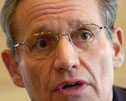 The trouble with what Bob Woodward seemed to be saying in the October 3 excerpt from his new book in the Washington Post – and on Larry King’s CNN TV show the night before – was that it reduces the whole healthy US domestic controversy over the Iraq War these days to a question of not putting enough troops on the ground to get the job done properly. The principal villain in this version of the story is defense secretary Donald Rumsfeld, who insisted on sticking with a lean and mean force. (And for at least some reasons that actually make sense – too many troops, e.g., could send a wrong signal about long-term US intentions in the Middle East.) But what is lost in all this is of course the much bolder hypothesis that the whole idea of the Iraq War was just tragically mistaken – and doomed to fail – from the start.
The trouble with what Bob Woodward seemed to be saying in the October 3 excerpt from his new book in the Washington Post – and on Larry King’s CNN TV show the night before – was that it reduces the whole healthy US domestic controversy over the Iraq War these days to a question of not putting enough troops on the ground to get the job done properly. The principal villain in this version of the story is defense secretary Donald Rumsfeld, who insisted on sticking with a lean and mean force. (And for at least some reasons that actually make sense – too many troops, e.g., could send a wrong signal about long-term US intentions in the Middle East.) But what is lost in all this is of course the much bolder hypothesis that the whole idea of the Iraq War was just tragically mistaken – and doomed to fail – from the start.
Brent Scowcroft was right …
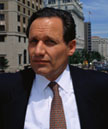 President George W. Bush does look bad in Woodward’s account in the October 3 Post. But this is mainly because he could only screw up the courage to try to get his chief of staff Andy Card to tell Rumsfeld to send in more troops at one critical juncture.
President George W. Bush does look bad in Woodward’s account in the October 3 Post. But this is mainly because he could only screw up the courage to try to get his chief of staff Andy Card to tell Rumsfeld to send in more troops at one critical juncture.
Alas, Rumsfeld told Card that if the president wanted such a thing he’d have to tell Rumsfeld himself. And then, the story apparently goes, when Rumsfeld finally telephoned the president on the point, the great cheerleader George W. Bush wimped out, and did not insist on more troops in the face of Rumsfeld’s objections.
Yet in the fall of 2006 it remains in many ways more convincing to deduce that it is not really the defense secretary’s over-egotistically flawed implementation of the concept of the Iraq War that has brought we people of the free and democratic world to the sad and sorry place we are apparently stuck in now.
 And you did not have to be any raving left-wing lunatic to think the bolder thought that the whole concept of the war was tragically ill-advised in the very beginning, whatever your ideological point of view or broad outlook on the giant if nonetheless urgent puzzle of US foreign policy in the global village today.
And you did not have to be any raving left-wing lunatic to think the bolder thought that the whole concept of the war was tragically ill-advised in the very beginning, whatever your ideological point of view or broad outlook on the giant if nonetheless urgent puzzle of US foreign policy in the global village today.
Brent Scowcroft, e.g., an old-school conservative “realist” advisor to the elder George H.W. Bush, protested publicly against the whole concept of going to war in Iraq in the initial debate back in the summer of 2002 (and even in the immediate wake of 9/11, in October 2001).
The most obvious conclusion to be drawn from the increasingly appalling Mess-O-Potamia of the past few years is just that Brent Scowcroft was right.
Woodward is no Robert Redford on TV …
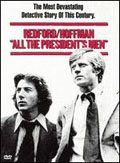 Whatever anxious decision you may personally come to on such a weighty matter, if you have been watching democracy in America unfold on television since the 1960s one altogether clear point is that Bob Woodward is no matinee-idol match for the Robert Redford who played him in the 1976 movie All the President’s Men. (Dream on Woodward, etc. …)
Whatever anxious decision you may personally come to on such a weighty matter, if you have been watching democracy in America unfold on television since the 1960s one altogether clear point is that Bob Woodward is no matinee-idol match for the Robert Redford who played him in the 1976 movie All the President’s Men. (Dream on Woodward, etc. …)
Another question you wonder about is how come it was Woodward, and not his Watergate-era condottierre Carl Bernstein (i.e. Dustin Hoffman), who went on to write the great American trilogy about the rise and fall of the George W. Bush administration in the early 21st century?
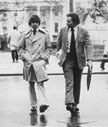 Yet again, whatever the most profound answer to this last question may be, it is hard not to marvel at Bob Woodward’s mental toughness and political composure when you see him on TV.
Yet again, whatever the most profound answer to this last question may be, it is hard not to marvel at Bob Woodward’s mental toughness and political composure when you see him on TV.
His reporting trilogy is bound to be somewhat flawed, so to speak, because it just gives you what those inside the machine say they think about what they are doing. But it is nonetheless fascinating and no doubt bound to become a key resource for future historians, who will probe the deeper story of what has really been going on in Washington over the past several years.
What should the USA today do now?
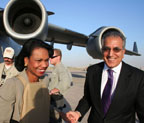 So suppose you do agree with the much bolder hypothesis that the whole idea of the Iraq War was just tragically mistaken – and doomed to fail – from the start. What should the USA today do now? Especially granting that immediately bringing all US troops home from the current deadly turmoil in Iraq is not an entirely sensible (or honorable) policy?
So suppose you do agree with the much bolder hypothesis that the whole idea of the Iraq War was just tragically mistaken – and doomed to fail – from the start. What should the USA today do now? Especially granting that immediately bringing all US troops home from the current deadly turmoil in Iraq is not an entirely sensible (or honorable) policy?
(Even if it might actually be a bit more sensible than anything the current weight of informed opinion in Washington will still remotely allow. If it is true, e.g., as more than a few retired generals seem to keep telling us on TV, that the mere presence of US troops in Iraq is itself helping to fuel the current insurgency, then adroitly withdrawing a sizeable enough group in the not very distant future – and perhaps even sending it somewhere else close by, like Afghanistan? – does not sound entirely crazy.)
I would of course not really pretend to have any great or even modest answers to the ultimate big question myself at the moment. But if you do believe in the much bolder hypothesis, then someone ought to be doing something more sensible than is being done right now in Iraq, and soon enough too.
 It would be very encouraging if this were the increasingly focused subject of the US mid-term election campaign that now has just over 30 days to go. But of course it is not. The Democrats, e.g., certainly do not seem to have yet arrived at any even untidy but perhaps workable strategy for deftly moving back from the tragic mistake in Iraq, while strengthening the struggle against Al Qaeda and its co-conspirators in the Middle East and around the world, and so forth.
It would be very encouraging if this were the increasingly focused subject of the US mid-term election campaign that now has just over 30 days to go. But of course it is not. The Democrats, e.g., certainly do not seem to have yet arrived at any even untidy but perhaps workable strategy for deftly moving back from the tragic mistake in Iraq, while strengthening the struggle against Al Qaeda and its co-conspirators in the Middle East and around the world, and so forth.
The main attraction of the Democrats in the 2006 mid term elections – hopefully in any case – is just that they will almost by definition be open to doing something different than President George W. Bush currently seems prepared to do. And since what he is doing is so clearly not working, it is something different that increasingly needs to be done.
So, the most plausible progressive theory of the moment would seem to go, maybe if there are enough more Democrats in Congress and state governments after November 7, the current benign shifts in the US domestic political mood on the War in Iraq will continue to grow in more sensible directions. And at some point, maybe again, even President Bush will figure out how to take advantage of the new mood, without altogether discrediting himself and his earlier record in his last two years. (Or at least the Democrats will finally be ready to do the right thing in the presidential election of 2008. Again, that at any rate seems to be the political theory.)
The “five geographically defined unified commands within the Department of Defense”
 Meanwhile, hearing about Bob Woodward’s new book has at least prompted me to dig a little deeper into a question that’s been at the back of my mind, ever since I started watching the tragic mistake of the Iraq War unfold on US TV. To be quite exact, why is the one of the “five geographically defined unified commands within the [US] Department of Defense” that is in charge of the Middle East called the “Central Command” (or “CENTCOM”)?
Meanwhile, hearing about Bob Woodward’s new book has at least prompted me to dig a little deeper into a question that’s been at the back of my mind, ever since I started watching the tragic mistake of the Iraq War unfold on US TV. To be quite exact, why is the one of the “five geographically defined unified commands within the [US] Department of Defense” that is in charge of the Middle East called the “Central Command” (or “CENTCOM”)?
Just on the face of things, wouldn’t it be more logical, from the standpoint of the sovereign American people, to have the Central Command in charge of defending the USA itself (and perhaps these days of course the “North America” that includes Canada, Mexico, and certain other parts of the Caribbean)?
CENTCOM & NORTHCOM today. In fact it is the “Northern Command” (or “NORTHCOM”) that is given this home ground of the American people on the earth’s surface to protect. (And Canadians might be especially interested to hear that “USNORTHCOM was officially created Oct. 1, 2002, and became fully operationally capable Sept. 11, 2003. Starting with about 150 personnel, the command has grown to more than 1,200, including American and Canadian military personnel and civilians. USNORTHCOM and the North American Aerospace Defense Command share headquarters facilities and many command components.”)
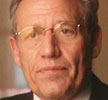 USCENTCOM, on the other hand “is one of the five geographically defined unified commands within the Department of Defense. Today it is responsible for planning and conducting United States (US) military activity in a region consisting of 27 countries in Northeast Africa, Southwest and Central Asia, and the island nation of the Seychelles.” This of course includes Iraq, and Afghanistan, and CENTCOM is no doubt where the big action is nowadays.
USCENTCOM, on the other hand “is one of the five geographically defined unified commands within the Department of Defense. Today it is responsible for planning and conducting United States (US) military activity in a region consisting of 27 countries in Northeast Africa, Southwest and Central Asia, and the island nation of the Seychelles.” This of course includes Iraq, and Afghanistan, and CENTCOM is no doubt where the big action is nowadays.
Yet again you wonder. Why should the United States, located in the middle of North America, regard the Middle East and its surrounding region of the world as “central”? The official answer is not entirely helpful: “As its name implies, USCENTCOM covers the central’ area of the globe located between the European and Pacific Commands.” And you start to imagine that maybe “central” here really does have more to do with the central location for so much of the current global oil supply, and George W. Bush’s alleged home state of Texas, etc, etc, etc.
The history back to 1946. Delving even just a little more into the history of all this suggests some kind of greater complexity. The current five geographically defined US unified commands – in alphabetical order, Central, European, Northern, Pacific, and Southern – do flow from a “Unified Command Plan” introduced by Donald Rumsfeld in April 2002. But this is only the most systematic and comprehensive incarnation of a plot that has been evolving since the end of the Second World War.
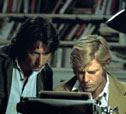 Thus: “In December 1946, President Truman approved recommendations of the Joint Chiefs of Staff for a comprehensive system of military commands to put responsibility for conducting military operations of all military forces in various geographical areas, in the hands of a single commander.” The current “oldest and largest of the United States’ unified commands” is the Pacific Command, established “on 1 January 1947.” It clearly has a lot to do with conceptions of US security needs that ultimately flowed from the attack on Pearl Harbor in 1942 (and nowadays focus on the rising new economic colossi of China and India).
Thus: “In December 1946, President Truman approved recommendations of the Joint Chiefs of Staff for a comprehensive system of military commands to put responsibility for conducting military operations of all military forces in various geographical areas, in the hands of a single commander.” The current “oldest and largest of the United States’ unified commands” is the Pacific Command, established “on 1 January 1947.” It clearly has a lot to do with conceptions of US security needs that ultimately flowed from the attack on Pearl Harbor in 1942 (and nowadays focus on the rising new economic colossi of China and India).
What is now known as the Southern Command “did not become fully operational until March 10, 1948.” Today it has “responsibility for US military operations primarily in Central and South America.” But the “United States Southern Command (USSOUTHCOM)” ultimately “traces its origins to 1903 when the first U.S. Marines arrived in Panama to protect the Panama Railroad connecting the Atlantic and Pacific Oceans across the narrow waist of the Panamanian Isthmus.”
Similarly: “Although the Headquarters United States European Command (HQ USEUCOM) was formally established on 1 August 1952, its activation can be seen as an evolutionary process that actually began in the European Theater of Operations (ETO) during the Second World War. This process has subsequently been shaped by the onset, escalation, and end of the Cold War.”
From Amercian republic to American empire? Viewed in this evolutionary perspective, what is now called the Central Command did not officially take shape until the 1980s: “An evolutionary development of the temporary Rapid Deployment Joint Task Force (RDJTF) established by the Carter administration, USCENTCOM was established January 1, 1983 … Today’s command evolved as a practical solution to the problem of projecting US military power to the Gulf region from halfway around the world.”
 Finally, as noted above, the most recent of the current five geographic commands, the so-called Northern Command, defending the US homeland and its immediately adjacent geography, was only precipitated by the massive terrorist incidents of September 11, 2001. (“USNORTHCOM was officially created Oct. 1, 2002, and became fully operationally capable Sept. 11, 2003.”)
Finally, as noted above, the most recent of the current five geographic commands, the so-called Northern Command, defending the US homeland and its immediately adjacent geography, was only precipitated by the massive terrorist incidents of September 11, 2001. (“USNORTHCOM was officially created Oct. 1, 2002, and became fully operationally capable Sept. 11, 2003.”)
One big trouble with all of this in 2006, is that – however innocuously the five geographically defined US unified commands around the world today may have begun – they are starting to at least look a bit alarmingly like vaguely updated artifacts of the old European global imperialism, or colonialism, that was supposed to have come to an end in the 1960s. (And many older Canadians at least may remember the wise old saying about how the old British empire was established “in a fit of absence of mind.”)
 Once upon a time, of course, the original free and democratic republic of the United States of America was the original successful rebel against European colonialism. And the final 20th century demise of the old European imperialism was helped along by the kind of US foreign policy that Franklin Roosevelt urged on Winston Churchill in the 1940s, or that Dwight Eisenhower urged on Britain and France at the time of the Suez Crisis in the 1950s.
Once upon a time, of course, the original free and democratic republic of the United States of America was the original successful rebel against European colonialism. And the final 20th century demise of the old European imperialism was helped along by the kind of US foreign policy that Franklin Roosevelt urged on Winston Churchill in the 1940s, or that Dwight Eisenhower urged on Britain and France at the time of the Suez Crisis in the 1950s.
It is similarly a great irony that the United States has subsequently stumbled into picking up so many apparent old pieces of the failed European/global imperialist project by the early years of the 21st century. And it would be extremely encouraging if the whole healthy US domestic controversy over the Iraq War these days were to somehow hone in on this more general problem as well. Is the “five geographically defined unified commands within the Department of Defense” really what democracy in America wants to be best known for around the world today?
But as yet there are still only a very few signs of anything quite like that.

